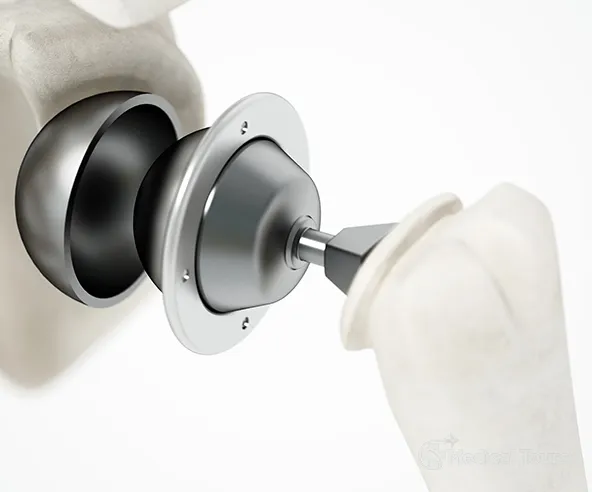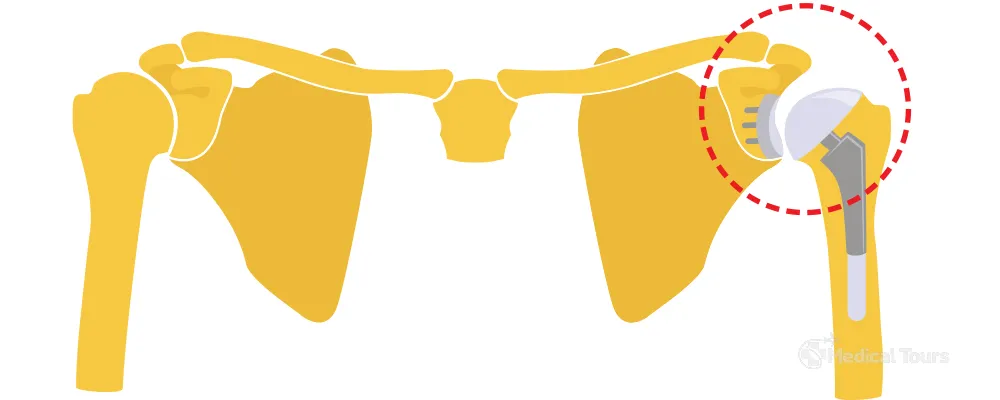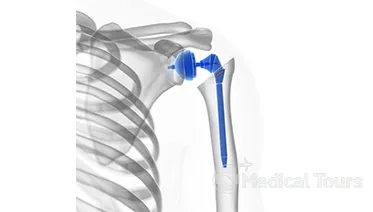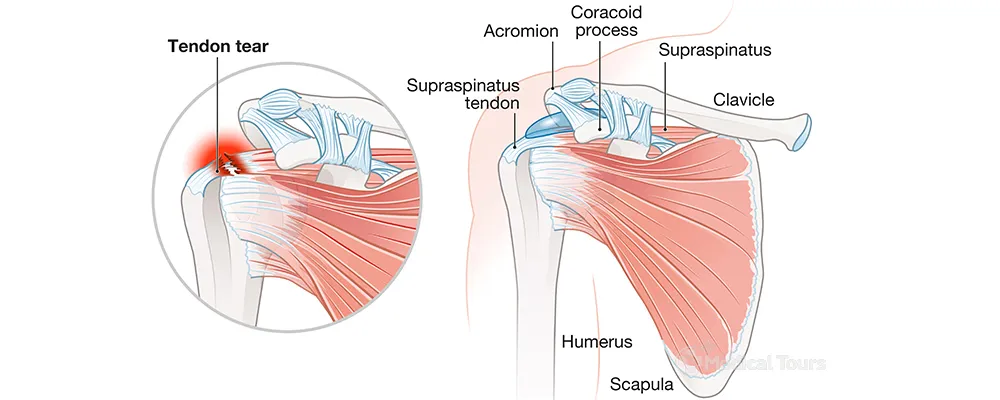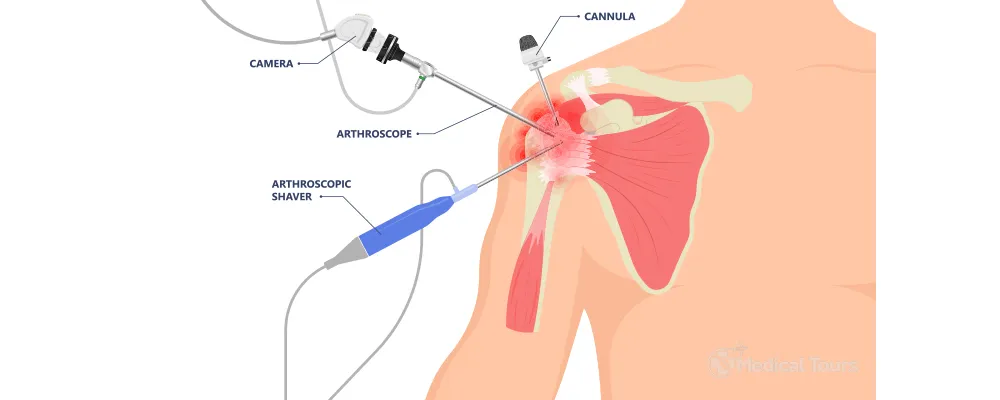Shoulder surgery is the surgical procedure to repair a torn or damaged rotator cuff. The rotator cuff are four tendons that help you lift your arm from you shoulder joint, along with other arm movement. Shoulder surgery can be done in two ways: arthroscopic and open. By removing damaged tissue and repairing damaged joints, a surgeon can restore normal function to your shoulder. Surgery helps to relieve pain and improve the range of motion. The artificial joint is designed to last at least 15 years but may wear out sooner if you have rheumatoid arthritis or a medical condition that affects other joints, such as diabetes mellitus, pseudogout and gout. Shoulder Joint Replacement Surgery involves either total removal of the entire shoulder joint (total shoulder) or only partial removal (subacromial decompression).
These are the most common reasons why shoulder replacement surgery is recommended. If you are suffering from any of these symptoms or have a history of shoulder injury, you may be a candidate for shoulder joint replacement.
Shoulder pain is a major unmet need for many people who are suffering from weakness in their shoulders. Patients may struggle with daily tasks such as bathing, washing, toileting and dressing. Although there are treatments such as anti-inflammatory medicines, cortisone injections and physiotherapy, these do not always relieve the patient’s pain and can result in other serious side effects if used long term.
When it comes to Shoulder Surgery, there are several options available. Although they are not as common as knee or hip replacement, they are equally successful in relieving shoulder pain. The orthopaedic physician will take an expert decision to treat the broad range of Shoulder Conditions & Treatments that can occur at any stage of life.
Total Shoulder Replacement Surgery is done for pain relief and improved motion function in patients suffering from a variety of arthritic conditions. The surgery involves the replacement of both sides of the joint which include the humeral head and glenoid.
The Total Shoulder Replacement Surgery is done to replace the cartilage in the shoulder joint with a metal ball and smooth, plastic socket. The surgery is performed using an arthroscope, which is a small telescope attached to high-definition video camera.
Partial Shoulder Replacement Surgery is a minimally invasive surgery that is performed in case of complete and partial rotator cuff tears, osteoarthritis, and traumatic injuries. In a Partial Shoulder Replacement Surgery, the damaged joint surfaces are removed and replaced with synthetic parts. This can be done through small incisions on the anterior side of the shoulder.
The rotator cuff is the group of muscles, tendons and ligaments that aid in rotating and stabilizing your shoulder. It includes four muscles that wrap around the head of your humerus and attach to the top of your scapula (shoulder blade). When these muscles are torn or injured, they can cause pain and weakness passing through the arm or into the neck.
If you experience pain in the shoulders, especially if it is intense, you may have a rotator cuff tear. Rotator cuff surgery repair procedure to repair the injured tissues of an injured shoulder involves using stitches and staples to fix the tear.
Shoulder arthroscopy is a new surgical procedure that allows doctors to look inside the shoulder joint. During the operation, the surgeon makes a few small incisions in the shoulder area to view ligaments, tendons, and cartilage damage. This kind of surgery requires a small incision and stitches instead of large skin cuts and scarring with traditional open surgery. As a result, it can allow patients to get back on their feet right away, with little pain and maximum recovery time.
The common aim of the arthroscopic shoulder surgery is to reduce pain and improve mobility. The surgical procedure can be performed under local or general anaesthesia. After the surgery, patients can go home after a few hours unless they must be admitted in the hospital for observation.
Following shoulder replacement surgery, you are required to wear an arm sling for a few days. To reduce the risk of infection, it is important to follow your physician's advice about hygiene, diet, and medications. The average time for full recovery is about three weeks. During this period, physical therapy will help your arm regain its flexibility and strength.
The shoulder arthroscopy is a procedure to remove the shoulder joint from the socket to clean out the damaged tissue, loose fragments or foreign body that are stuck in it. This procedure is also used on patients who were diagnosed with frozen shoulder. The cost of this surgery can vary depending on where you receive treatment and what amenities/instruments will be used.
If you are planning to visit India for your medical treatment, then make sure to read the post about Shoulder Surgery. Also, make sure you have booked a medical tour to India with our consulting team. To know more details, keep browsing our site.
The average cost of shoulder replacement surgery in India ranges between USD 5000 to USD 8100 (INR 396522 to INR 642366). The cost can be high or low and it depends on several factors including your medical condition, the surgeon, the type of hospital, and the location that you choose.
Your shoulder is a ball-and-socket joint. The ball, or mind, of your upper arm bone fits right into a shallow socket in your shoulder blade. The front part of the shoulder includes an area called the deltoid, which is used in raising your arm forward and back. The muscles and tendons that connect the two bones together include the rotator cuff.
If you have pain in the shoulder, it is important that you seek treatment. Only when it is impossible to reduce your pain with treatments such as injections and physiotherapy, you should consider surgery.
The procedure of TSA is widely considered a very effective treatment, with many patients satisfied after one year. The likelihood of success will depend on the extent of your condition, but this technique has given many people a new lease on life.
In shoulder replacement surgery, the broken areas of the shoulder are removed and replaced with synthetic parts, called a prosthesis. These parts restore the strength and function of your shoulder and help you return to normal activities as quickly as possible. As with any surgery, there is always some pain involved and that pain is treated before or after the operation.
Returning to work is dependent upon the location of the surgery, but a general rule is that if you can do light work two weeks after surgery, full duties four weeks after surgery. Work is limited to 4-6 hours, four days a week until the bones are fully healed, and you reach your target range of motion.
People who have had total shoulder replacement surgery commonly report that the pain is reduced, range of motion is improved, and there may be overall better quality of life. It can take a few months before you become aware of all these advantages.
One of the disadvantages of using a substituted joint is that the replacement might not be as great as a normally-functioning all-natural joint. Another disadvantage is that the selection of movement may not be as great, and there will be some movements that are not possible. This can make performing everyday tasks difficult. Another disadvantage is that replacement joints do wear out over time, so you may need another surgery later in life to replace your joint again.

